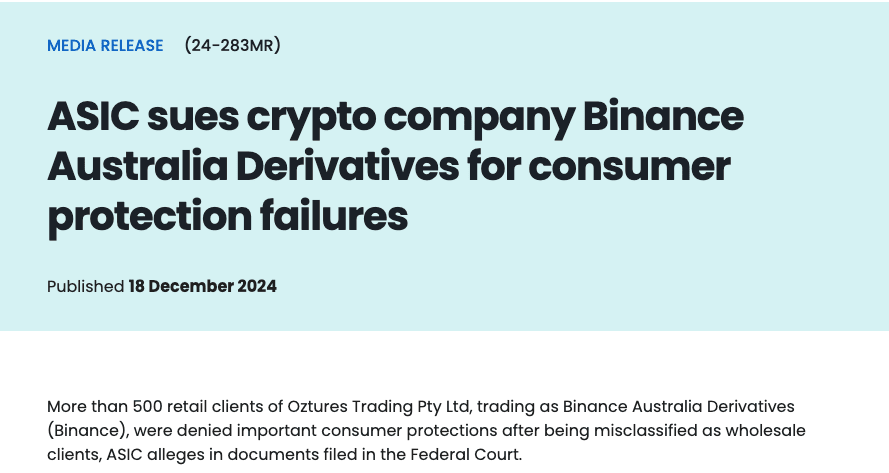📣 Binance Australia Sued Over Consumer Protection Violations
posted 18 Dec 2024
The Australian Securities and Investments Commission (ASIC) filed a lawsuit against Binance Australia Derivatives for failing to provide adequate consumer protections to over 500 clients.
The Australian Securities and Investments Commission (ASIC) filed a lawsuit against Binance Australia Derivatives for failing to provide adequate consumer protections to over 500 clients.

ASIC accuses Binance of several violations, including failing to provide necessary client disclosures, maintaining proper dispute resolution, complying with the conditions of its license, and ensuring its employees were adequately trained and competent.
The regulator started looking into Binance's financial services, including how it classified wholesale clients in December 2022. This led to ASIC sending a notice to consider whether Binance Australia Derivatives should lose or have its Australian financial services license suspended. On April 6, 2023, ASIC canceled the license after a request from Binance.
Earlier this month, ASIC fined Kraken operator Bit Trade $8 million for design and distribution obligation failures.
ASIC emphasized it will continue to “safeguard consumers and uphold market integrity in the digital asset sector.”
According to a December 19 press release by the Australian regulator, Binance offered crypto derivative products to 505 Australian retail investors between July 7, 2022, and April 21, 2023. These clients were misclassified as wholesale clients, making up 83% of Binance's Australian client base.

ASIC sues Binance over consumer protection violations. Source: asic.gov
In documents filed in the Federal Court, ASIC claims that Oztures Trading Ltd, operator of Binance Australia Derivatives, didn’t meet Australian financial services laws related to derivatives trading.
Our case alleges Binance’s compliance systems were woefully inadequate and exposed more than 500 clients to high-risk, speculative products without the right consumer protections in place,said ASIC Deputy Chair Sarah Court.
She noted that many of the clients faced financial losses, adding that in 2023 Binance compensated around $13 million to affected clients.
ASIC accuses Binance of several violations, including failing to provide necessary client disclosures, maintaining proper dispute resolution, complying with the conditions of its license, and ensuring its employees were adequately trained and competent.
The regulator started looking into Binance's financial services, including how it classified wholesale clients in December 2022. This led to ASIC sending a notice to consider whether Binance Australia Derivatives should lose or have its Australian financial services license suspended. On April 6, 2023, ASIC canceled the license after a request from Binance.
Earlier this month, ASIC fined Kraken operator Bit Trade $8 million for design and distribution obligation failures.
ASIC emphasized it will continue to “safeguard consumers and uphold market integrity in the digital asset sector.”

